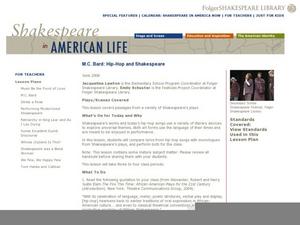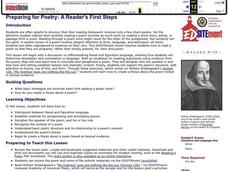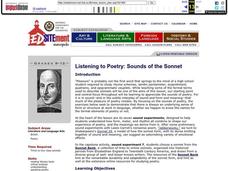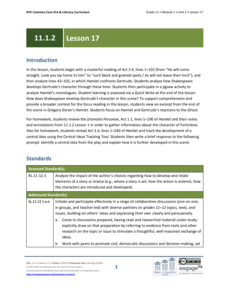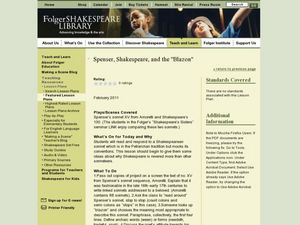Curated OER
M.C. Bard: Hip-Hop and Shakespeare
What is poetry? Does hip-hop qualify as poetry? Do Shakespeare's monologues qualify as poetry? Class members grapple with these questions as they examine the poetic elements and themes presented in different texts. Groups of four study...
Curated OER
"Music Be the Food of Love:" Found Poetry with Shakespeare and Hip-Hop
Lines from Shakespeare and from hip-hop artists provide learners with an opportunity to examine the literary devices these artists use to express their ideas about love. Groups use the provided lines to craft found poems, and then the...
Curated OER
William Shakespeare's Julius Caesar: Fate Versus Free Will
Learners relate legends of lucky objects such as a rabbit's foot and principles of Feng Shui to fate and free will concepts that are expressed in Shakespeare's play, "Julius Casear". In small groups, they redesign the palace of Casear to...
Prestwick House
Teaching Shakespeare: Sonnet 73
It's that time of year to consider how Shakespeare selects his images and structures his Sonnet 73 to develop the meaning of the poem. Class members examine the rhyme scheme, the indented lines, the conceit, and the images used in each...
Curated OER
Figurative and literal language through the study of Shakespeare
Sixth graders explore figurative and literal language. They study literary devices through short pieces of Shakespeare's work. Then investigate Shakespeare's works and life.
Curated OER
Rewriting Shakespeare
Have your learners play around with Shakespeare's language. In this plan, small groups examine and rearrange soliloquies from Othello, noting how the language changes and morphs. All groups have a chance to change each soliloquy, making...
Utah Education Network (UEN)
7th Grade Poetry: Sonnet Poem
Two sonnets provide seventh graders with examples of Shakespearean sonnets. After discussing the story of the poems and analyzing their rhyme scheme and rhythm, young poets craft a Shakespearian sonnet and share their work with two...
EngageNY
Author’s Craft: The Poetry of the Play
Feel the rhythm! Pupils begin reading Act 2, Scene 1 of Shakespeare's A Midsummer Night's Dream as they continue participating in a drama circle. With discussion, they examine Shakespeare's use of rhyme, rhythm, and meter, analyzing how...
EngageNY
Mid-Unit Assessment: Author’s Craft: Analyzing Shakespeare’s Craft: Part 2
Annoyed or bewitched—how does an author's word choice affect a text? Scholars begin the instructional activity by analyzing word choice in Shakespeare's A Midsummer Night's Dream. Next, learners take a closer look at the narrative...
Curated OER
Working with Shakespeare, the Poet and Dramatist
Students study the work of William Shakespeare. They survey the elements of comedy and tragedy and read plays and poems. They discuss the texts they read and recite poetry. They dramatize poems with movement and sounds and write poetry...
Curated OER
Preparing for Poetry: A Reader's First Steps
Students examine denotation and connotation in language, and paraphrase a poem. They read and analyze a sonnet by iam Shakespeare, analyze the attitude and tone, paraphrase a poem, and create a thesis about a poem based on textual evidence.
Curated OER
Preparing for Poetry: A Reader's First Steps
Students complete poetry analysis using William Shakespeare's "Sonnet 130" as a part of a study of figurative language. In this Shakespearean language activity, students define literal and figurative language and practice paraphrasing...
Curated OER
Listening to Poetry: Sounds of the Sonnet
Young scholars experience and enjoy the sounds of poetry. They erform sound experiments with sonnets and closely read and analyze a sonnet by Shakespeare. Students write an analysis of how sound affects meaning in a sonnet chosen from...
Curated OER
"Music Be the Food Of Love": Found Poetry with Shakespeare and Hip Hop
High schoolers create found poetry using lines from hip hop songs and Shakespeare's plays. They try to rewrite the words to music so that more people can explain Shakespeare's plays. They discuss the results of the activity.
Curated OER
M.C. Bard: Hip Hop and Shakespeare
Young scholars compare lyrics from hip hop songs with monologues from Shakespeare's plays, and perform both for the class.
Curated OER
A Way with Words or Say What?
Students explore the language of Shakespeare. In this literature lesson, students examine words invented by Shakespeare as they interpret their meanings in drawings. Students pantomime the meanings and then write a short story...
Curated OER
William Shakespeare's Julius Caesar: Fate versus Free Will
Tenth graders explore Shakespeare's Julius Caesar. After reading specific scenes, they brainstorm and discuss free will. Students observe a clip from the Dr. Phil television show entitled, "Afraid to Age" and make connections from the...
EngageNY
Grade 11 ELA Module 1: Unit 2, Lesson 17
Why is Hamlet so upset with Gertrude? Using the resource, scholars read Act 3.4 of Hamlet, analyzing how Shakespeare develops Gertrude's character in the scene. Next, pupils participate in a jigsaw activity to discuss Hamlet's monologues.
Curated OER
The Portrayal of the Witches
Eleventh graders discover the importance of the fortune teller in Shakespeare's Macbeth. After watching two interpretations of the play, they examine and compare the portrayal of the character. They create their own modern adaptation of...
Curated OER
10 Things I Hate about Shakespeare
Students look at the works of Shakespeare to describe and explain relationships among some of the different texts. The writing of the learners has the intent of increasing comprehension, interpretation, and critical analysis skills.
Curated OER
Discovering Shakespeare's Language through Sonnet 27
Students explore the language of Shakespeare. In this poetry lesson, students watch a video of illuminated images that accompany Sonnet 27. Students analyze the language of the poem and the image selections.
Curated OER
Spenser, Shakespeare, and the "Blazon": Lesson 4
Pupils discuss the meaning and tone of Shakespeare's Sonnet 130. In this sonnets lesson, students compare Spenser's sonnets to Shakespeare's. Pupils discuss specific words that add to the humor in Shakespeare's sonnet, paying...
Curated OER
Character Found Poems: Investigating Language in Twelfth Night
Students create found poems to represent characters in Twelfth Night. In this Shakespeare lesson, students discuss how to compose found poems and select characters from the play to write their poems about.
Curated OER
You Kiss the Book: Shakespeare's Romeo and Juliet
Students analyze imagery in Shakespeare's, Romeo and Juliet, and act out the passage to see how the author includes stage directions with his poetry.


